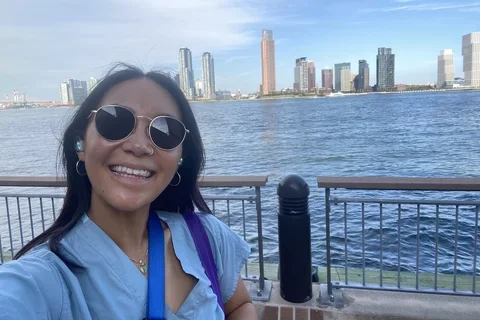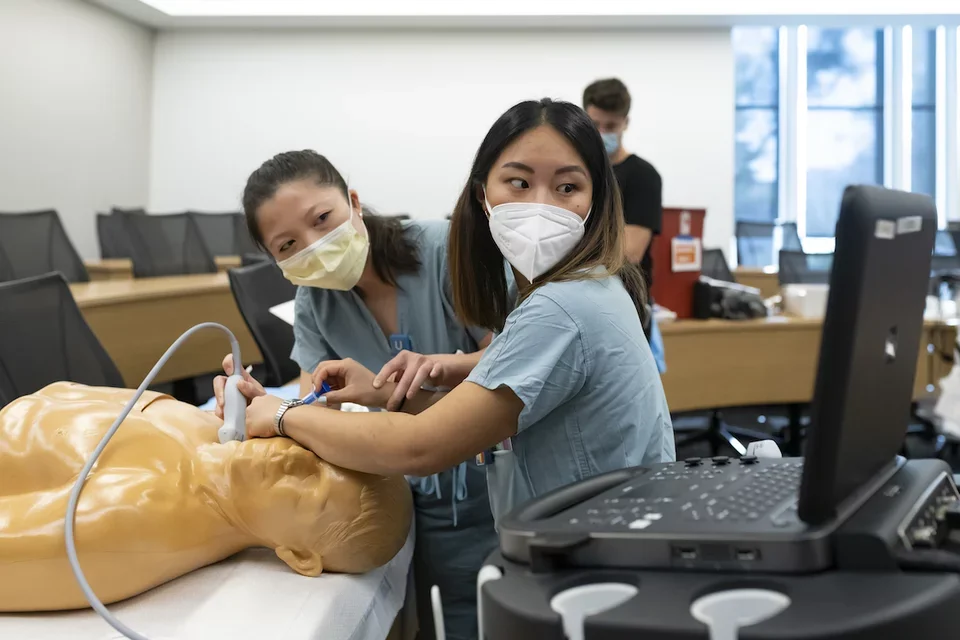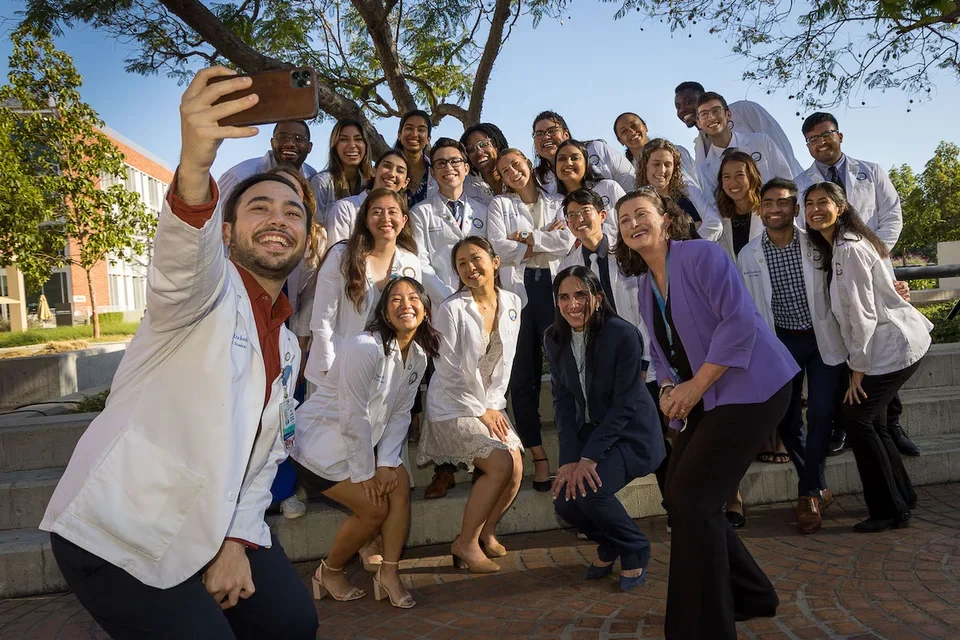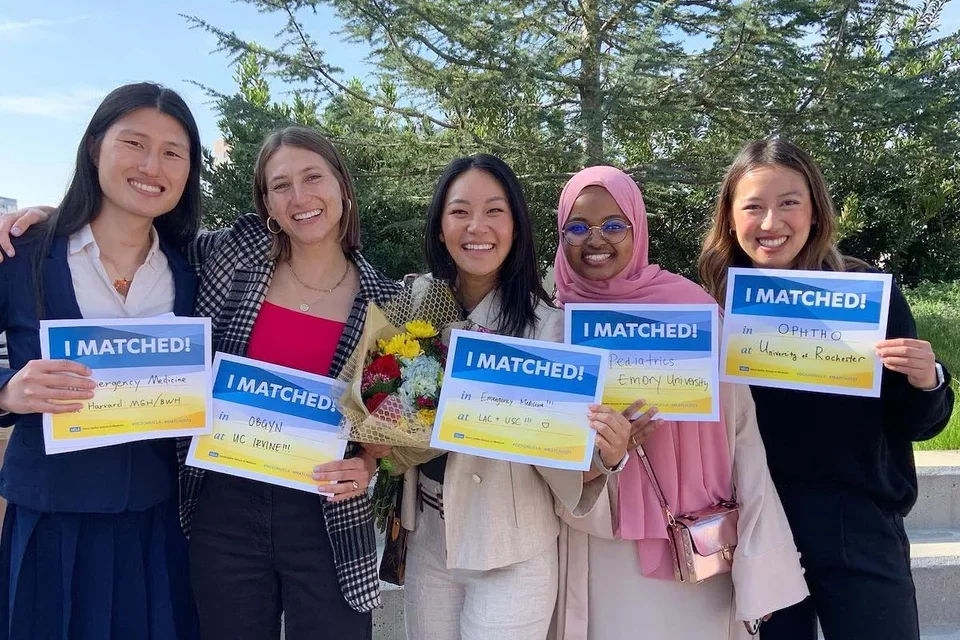Matching Into Residency: Angela Bi’s Story
Student Spotlight

Meet Angela Bi
- Specialty: Emergency Medicine
- Fun fact: She’s worked in Colombia, the United Kingdom, and the United States.
- Matched Residency Program: University of Southern California
A second-generation Chinese-American, Angela grew up in Rancho Cucamonga, California and enjoys cooking, dancing, and exercising.
After graduating from Pomona College, Angela worked as a Fulbright English teaching assistant in Colombia and then as a data support engineer in both San Francisco and London. Witnessing the discrepancies between health-care systems around the world inspired her to find solutions, and she decided to go to medical school.
“Coming back to school was hard for me,” she says. “I found it difficult to study all the time and adjust back to academics.”
She found strength in her friends and family, who supported her every step of the way — offering quality time, thoughtful guidance, or much-needed commiseration.
Despite the challenges of returning to school full time, Angela thrived in her new community. She served as her class well-being representative, was inducted into the Gold Humanism Honor Society, and participated in as many community-service events and health clinics as possible.
A Day in the Life of a Med Student: Preparing for Residency
When it came time to select a speciality and apply for residency programs, Angela chose emergency medicine, or as she puts it, she stumbled into emergency medicine.
“I knew coming into med school that I wanted to be a doctor who was good at everything. I’m the first physician in my family, so it was important to me to be able to treat my family members and friends.”
Emergency medicine provided the variety she desired. She compares getting into the emergency medicine selective to winning the lottery. It gave her the opportunity to work with top physicians at a top facility, treating an expansive array of patients and ailments.
“I thought it was really exciting to see all these patients, and even speak Spanish with some of them.”
In addition to broadness, what captivated Angela about emergency medicine was equity.
“We treat anyone who comes through the door, whether they have insurance, whether they don't. No matter what, we see everyone.”

Ranking Residency Programs
Angela ended up enjoying the residency interview process so much, she had a hard time narrowing down her top choices.
“I've genuinely liked every single program I've interviewed at,” she says. “They’re each spectacular and bring something different. Choosing one program means giving up another’s great qualities.”
A strong geographical preference made her choices a little bit easier. She wanted to stay in Southern California, or at least California, close to all the friends and family members she’d leaned on throughout her medical-school journey.
Ultimately, she sees her ranking challenges as a net positive.
“It just means emergency medicine is an exciting field. If anything, the interviews have solidified that I’m going into the right field.”
Looking Back: Memorable Med-School Moments
Match Day marks a major turning point for medical students. They’re on the brink of completing school and starting residency. It’s often a time for reflection.
Angela found the milestone bittersweet.
“The most challenging part is that I’m going to be separated from all my med-school friends. We studied together, cried together, shared meals together, laughed together, and danced together.”
She has a dream of one day working in the same hospital as her best med-school friend.
“I’m in the emergency room, and I call to consult a doctor, and it’s my friend. I think that'd be so much fun, but I know in reality, we can't all work in the same hospital.”

Awaiting Match Day, Angela also reflected on her early patients, the first of many lives she’ll touch throughout her career. She has vivid memories of a Spanish-speaking patient who had just experienced a heart attack.
“She was suffering from a lot of different things,” Angela says. “But one of her conditions was diabetes, and she was at the point where she really needed to be taking insulin every day.”
The woman believed insulin would worsen her diabetes and lead to blindness, but Angela knew that was a progression of diabetes itself — not a side effect of insulin treatment. She took the time to talk to the patient, seeking to understand and address her fears instead of dismissing them as erroneous.
“It finally came out that no doctor had ever sat her down and talked about diabetes progression and how insulin stops that and helps prevent all the horrible things that happen in your body as a result of insulin resistance. So she never made the connection between all the awful things she was experiencing and her diabetes.”
The patient continued refusing insulin, but Angela persisted, communicating with patience and compassion. While handling the patient’s discharge papers, Angela thought she would try suggesting insulin just one more time.
This time, the patient agreed.
“She told me she’d been thinking a lot about all I’d been telling her and that she appreciated all the time I’d taken to speak to her in Spanish. She said she could tell that I cared, and she felt she could really trust me.”
Earning the patient’s trust was an affirming, rewarding moment for Angela. She says conversations and experiences with her parents about linguistic, cultural, and socioeconomic barriers to care prepared her for this moment.
“There are so many different reasons that patients don't trust physicians, or can't trust physicians, or can't afford to trust physicians. Just having that personal experience made me more empathetic.”

Looking Forward: Residency and Beyond
Angela matched into her top choice emergency medicine residency program at the University of Southern California. She’s even more excited to take the next step in her medical career, knowing all her loved ones will be close by.
“I’m literally tripping with excitement to have the honor of serving the immigrant communities of East LA,” she posted on Instagram. “But there’s no way I could’ve gotten here without the incredible support of my village — my immigrant parents who braved a foreign country and language for opportunities they did not have at home, my mentors who lifted me up and showed me the way, my friends who believed in me when I definitely didn’t believe in myself, and my dear boyfriend whose endless love and support bring me to tears every time I think too hard.”
After residency, Angela hopes to bring her experience full circle, combining her new medical expertise with the desire that drove her to attend medical school: increasing worldwide healthcare access.



